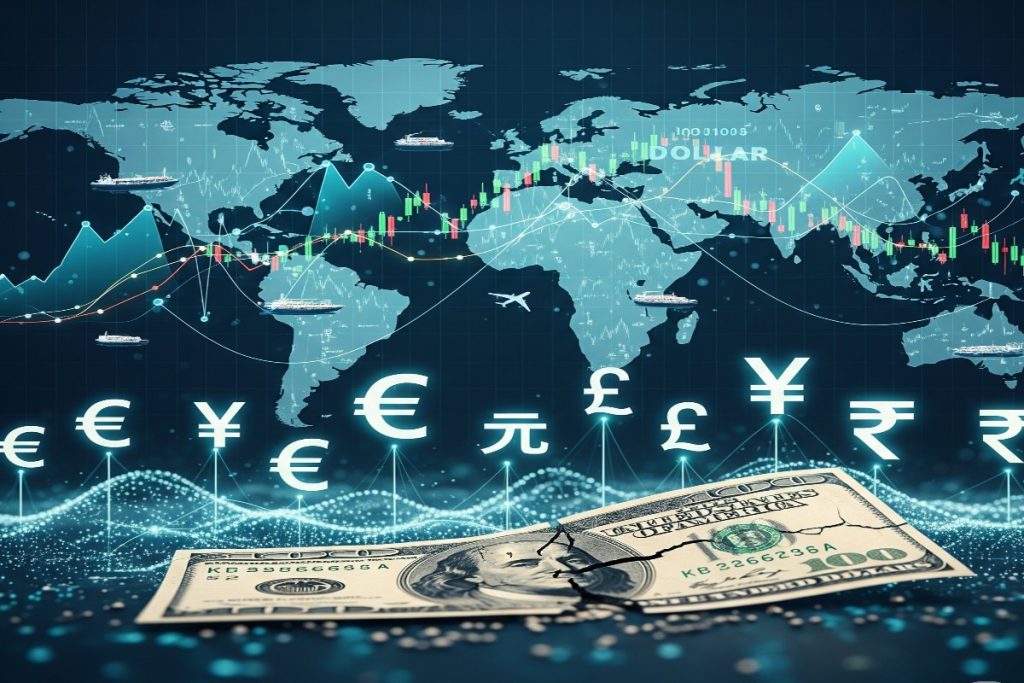Introduction
The U.S. dollar has long been central to global reserves, foreign trade, and oil transactions. But by 2025, its dominance is increasingly under question. We are seeing the start of a global currency shift in international trade due to changing alliances, the emergence of multipolar power centers, and the introduction of digital currencies. This blog explores the factors influencing this discussion, the leaders of the shift, and the potential implications for investors, companies, and regular people.
What’s Behind the Talk of Dollar Decline?
Trust in the U.S. economy, its institutions, and its worldwide impact is the foundation of the dollar’s dominance. But in recent years, its foundation has developed a number of cracks:
- High rates of inflation and interest rate fluctuations
- Growing national debt
- American political polarization.
- increased use of sanctions to weaponize the dollar
Concerns about a possible worldwide currency change in international trade have been raised by these causes, which have forced nations and organizations to look for alternatives. Even if the dollar is still strong today, diversification is obviously gaining traction.
Are Emerging Economies Ditching the Dollar?
Not completely yet, but there is a noticeable momentum. Emerging economies such as Brazil, Russia, India, China, and South Africa (collectively known as the BRICS bloc) have started to investigate non-dollar bilateral trade agreements particularly in the sectors of energy and defense with some even exploring the use of cryptocurrencies and blockchain-based systems for cross-border settlements.
Recent instances include:
- India and the UAE engaging in trade using rupees and dirhams
- Russia is now accepting rubles and yuan as payment for its oil exports.
- China promoting the use of its currency for investments in the Belt and Road Initiative.
These occurrences do not imply that the dollar has become irrelevant; however, they do suggest a significant trend: the shift in global currency within foreign trade is being propelled from the periphery towards the center, as smaller economies reclaim their financial autonomy.
The Rise of Yuan, Euro, and Digital Currencies
China’s yuan has made considerable strides in global transactions, now positioned among the top five. Central banks are boosting yuan reserves to hedge against dollar volatility, while the EU pushes for the euro’s role in global green finance. Meanwhile, Central Bank Digital Currencies (CBDCs) are emerging as a real disruptor. With over 100 countries exploring them, CBDCs could bypass SWIFT, enabling faster, cheaper, and more secure cross-border payments reducing reliance on the U.S. dollar and accelerating currency shifts in foreign trade.

How Geopolitics Is Reshaping Currency Alliances
Currency is a geopolitical weapon as well as an economic instrument. More than $300 billion in Russian reserves held in dollars and euros were frozen by Western sanctions following the conflict between Russia and Ukraine. This made it very evident to other countries that your assets are only secure if you have the same political views.
As a result, numerous nations are currently:
- Reserve portfolio diversification
- Creating local currency conduits for bilateral trade
- Gold hoarding as a neutral asset
- Investigating blockchain-based payment methods outside of the United States
Although a global currency transition in international trade is not happening overnight, geopolitical urgency rather than merely economic strategy is pushing for it.
Can BRICS Nations Build a Real Alternative?
The BRICS nations are currently engaged in discussions regarding the establishment of a new currency that would be supported by a combination of commodities or national reserves. Although this initiative remains in the conceptual phase, their objectives are distinctly outlined:
- Reduce reliance on the dollar for trade and lending
- Establish financial institutions that operate independently from the IMF and World Bank
- Facilitate South-South collaboration in technology and energy
The journey ahead is extensive, and numerous challenges exist ranging from divergent political agendas to technical intricacies but if they succeed, it could represent one of the most profound transformations in contemporary financial history.
Such advancements indicate that the global currency transition in foreign trade is no longer a matter of speculation; rather, it is a strategic endeavor being actively pursued in international forums.
What Role Do Sanctions and Oil Play?
Global trade relies heavily on oil, which has historically been exchanged nearly entirely in US dollars, hence the term “petrodollar.” However, today:
- Saudi Arabia is considering oil contracts with China based on yuan.
- Russian oil is sold in Indian rupees and rubles.
- After years of isolation due to sanctions, Iran and Venezuela are now using bartering and cryptocurrencies.
The dollar standard’s monopoly in the commodity market is being challenged by these energy-rich countries as they decouple from it. Ironically, sanctions that are meant to isolate are pushing more nations to develop alternative systems, which contributes to the greater global currency shift in international trade.
Should You Be Concerned About Dollar Exposure?
If you’re a business leader, investor, or global freelancer yes, you should pay attention. Dollar fluctuations affect:
- International loan interest rates
- Import/export costs
- Investment yields across emerging markets
- The purchasing power of remittances and salaries
Diversifying income sources, exploring multi-currency accounts, and staying updated on foreign exchange trends are smart strategies. In the new financial landscape, being aware of the global currency shift in foreign trade can protect you from economic shocks and open up new opportunities.
Conclusion
The decline of the dollar’s dominance won’t happen overnight, but its unchallenged status is clearly shifting. Geopolitics, digital currencies, and developing nations’ ambitions are driving a gradual change in global trade dynamics.
This shift urges businesses and individuals to rethink how they trade, invest, and save. As more professionals work remotely across borders, platforms like Wiraa become vital helping global talent navigate cross-border job opportunities, no matter the currency in favor.
While the dollar’s future remains uncertain, one thing is clear: the world of work, trade, and money is becoming increasingly global, digital, and fast-moving.




